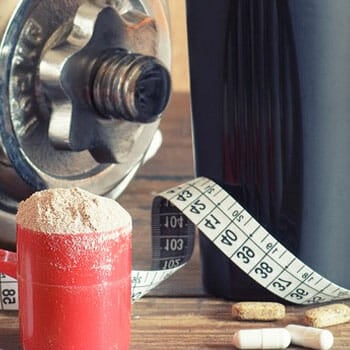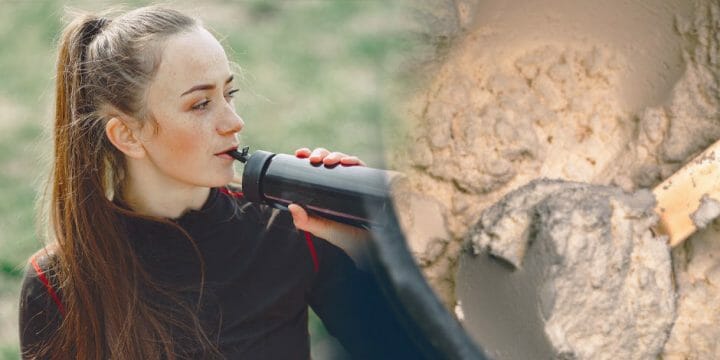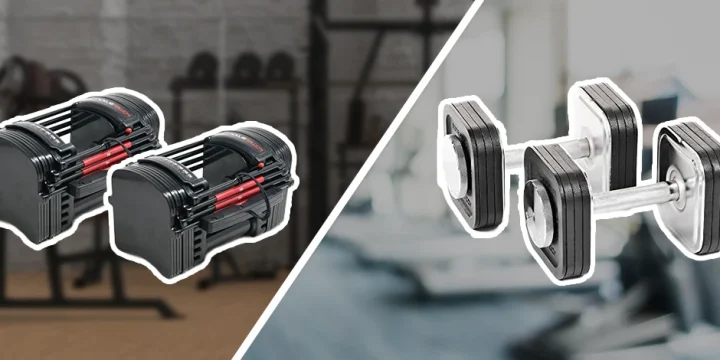One of the most widely studied supplements for muscle growth has been creatine.
And there is growing evidence of how creatine supplementation might drastically impact a bulking or loading phase. But there is still a lot of debate about creatine HCL vs. monohydrate, and you’ll see both on the shelves at your sports nutrition store.
But which type of creatine is best suited for your fitness level and goals?
We teamed up with a nutritionist to see if we could scientifically show the best form of creatine.
Quick Summary
- While creatine HCL offers faster absorption, creatine monohydrate's long history of proven effectiveness makes it a strong contender for the better type.
- Combining creatine with beta-alanine can enhance performance and reduce early muscle fatigue, offering a synergistic effect for athletes.
- Creatine monohydrate has been shown to be about 99.8% pure, ensuring almost full dosage efficiency when consumed.
- Given my experience, I recommend starting with creatine monohydrate due to its long-standing track record and comprehensive benefits.
Difference Between Creatine HCL And Creatine Monohydrate?
1. Absorption

One of the main differences between creatine HCL and creatine monohydrate is how fast your body may absorb them.
The creatine HCL form is bound to the hydrochloric acid molecule, which is highly water-soluble. That means you shouldn’t need too much planning about what to take it with and when.
A study published in the Food and Nutrition journal showed that once your stomach absorbs it, it’s much faster to become active in your muscle cells compared to the monohydrate form [1].
2. Effectiveness
The International Society of Sports Nutrition has done some research and found that over a longer period, creatine monohydrate offers more benefits important for athletic performance compared to creatine hydrochloride [2].
“Creatine is thought to improve strength, increase lean muscle mass, and help the muscles recover more quickly during exercise. This muscular boost might help athletes achieve bursts of speed and energy, especially during short bouts of high-intensity activities such as weight lifting or sprinting.”
- WebMD.com
Drawing from my years in competitive sports, I've personally used both creatine HCL and monohydrate.
While creatine HCL is newer, I've found it effective in my training regimens, complementing the proven track record of creatine monohydrate. So, based on my experience, both forms have their merits.
3. Purity

Between the two forms, creatine monohydrate wins hands down with purity.
The creatine monohydrate form is usually around 99.8% pure, meaning when you measure out 5 grams of creatine, you pretty much get the full dose. Creatine HCL isn’t as pure since it contains the stuff that it’s been mixed with, which makes it easier to absorb.
However, just because it’s not as pure doesn’t necessarily make it a negative.
4. Convenience
Scientists have measured that creatine HCL is 40 times more soluble than creatine monohydrate.
So if you take it as a powder supplement, it should almost instantly dissolve in a glass of water.
Some clients also find creatine HCL works within about 15 minutes, and they take their supplement after their warm-up routine.
5. Dietary Considerations and Interactions
Those on a ketogenic diet might find creatine monohydrate more beneficial due to its role in facilitating quick energy release, which complements the rapid energy needs of a low-carb lifestyle.
Conversely, vegan or vegetarian diets, typically lower in natural creatine sources like red meat, may see enhanced benefits from either form of creatine supplementation.
6. Side Effects

One of the advantages of creatine HCL compared to creatine monohydrate is its limited side effects, according to a study published in the Journal of the International Society of Sports Nutrition [3].
As your body may absorb it faster, there is a lower chance of stomach upset, bloating, and a water retention problem.
These potential side effects are the reason I always advise people who start to use creatine monohydrate to take smaller doses first to see how they react.
If you notice signs of swelling and water retention, then it might be better to switch from creatine monohydrate to HCL.
It might also be worth getting some medical advice.
7. Price
From my time managing both personal and client supplement budgets, I've observed that creatine HCL can be more costly for extended loading phases compared to monohydrate.
This is an important consideration for athletes who, like me, need to balance cost with performance.
The faster absorption and fewer adverse effects do come at a price. If cost is going to be an issue, then I suggest trying out creatine monohydrate, even if it’s slower-acting.
You could plan to take creatine monohydrate about 30 minutes before your workout and still get good results for increased muscle mass.

Stacking With Other Supplements

I would suggest avoiding creatine in other supplements, as you don’t want to be taking too much of it to avoid the potential side effects we mentioned earlier.
But the good thing about creatine HCL and creatine monohydrate is that most pre-, post-workout, and dietary supplements don’t often include much.
One option you might want to consider is stacking creatine supplements with beta-alanine.
The two supplements seem to work well together to boost your performance and reduce early signs of muscle fatigue. This combination has worked well for me, especially during intense training periods in kickboxing and MMA.
You may want to start with just micronized creatine and wait a week or two before adding beta-alanine. It ensures you don’t get any cramping from combining the two.
FAQs
Will Creatine HCL Make You Bigger?
Yes, creatine HCL can make you bigger with weight gain when combined with a high-intensity workout, as with creatine monohydrate. It might increase the amount of water in your muscle cells and develop more muscle fibers from resistance training.
Is Creatine HCL Bad for Your Teeth?
No, creatine HCL isn’t bad for your teeth unless you eat the powder without diluting it. The hydrochloric acid in the creatine supplement could impact your teeth, but in capsule and mixed form, it shouldn’t have any effects.
Should You Take Creatine Every Day?
You could take creatine every day, but it’s only beneficial when you do higher-intensity training.
How Long Does It Take for Creatine HCL to Work?
It takes about a week for creatine HCL to take effect. You would have to take the supplement consistently and work out for at least four days to see the impact of higher endurance, better physical performance, and muscle growth.
References:
- https://www.researchgate.net/publication/288670717
- https://www.researchgate.net/publication/317612254
- https://www.ncbi.nlm.nih.gov/pmc/articles/PMC3407788
About The Author
You May Also Like






